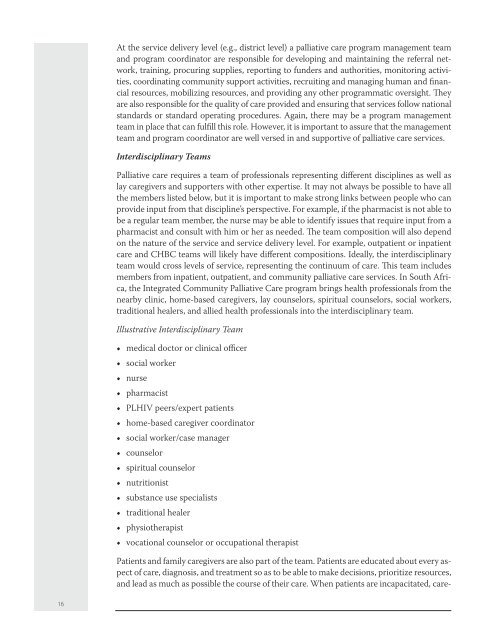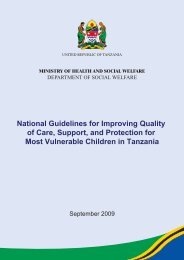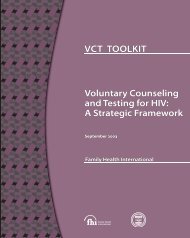Palliative Care Strategy for HIV and other diseases - FHI 360
Palliative Care Strategy for HIV and other diseases - FHI 360
Palliative Care Strategy for HIV and other diseases - FHI 360
Create successful ePaper yourself
Turn your PDF publications into a flip-book with our unique Google optimized e-Paper software.
16<br />
At the service delivery level (e.g., district level) a palliative care program management team<br />
<strong>and</strong> program coordinator are responsible <strong>for</strong> developing <strong>and</strong> maintaining the referral network,<br />
training, procuring supplies, reporting to funders <strong>and</strong> authorities, monitoring activities,<br />
coordinating community support activities, recruiting <strong>and</strong> managing human <strong>and</strong> financial<br />
resources, mobilizing resources, <strong>and</strong> providing any <strong>other</strong> programmatic oversight. They<br />
are also responsible <strong>for</strong> the quality of care provided <strong>and</strong> ensuring that services follow national<br />
st<strong>and</strong>ards or st<strong>and</strong>ard operating procedures. Again, there may be a program management<br />
team in place that can fulfill this role. However, it is important to assure that the management<br />
team <strong>and</strong> program coordinator are well versed in <strong>and</strong> supportive of palliative care services.<br />
Interdisciplinary Teams<br />
<strong>Palliative</strong> care requires a team of professionals representing different disciplines as well as<br />
lay caregivers <strong>and</strong> supporters with <strong>other</strong> expertise. It may not always be possible to have all<br />
the members listed below, but it is important to make strong links between people who can<br />
provide input from that discipline’s perspective. For example, if the pharmacist is not able to<br />
be a regular team member, the nurse may be able to identify issues that require input from a<br />
pharmacist <strong>and</strong> consult with him or her as needed. The team composition will also depend<br />
on the nature of the service <strong>and</strong> service delivery level. For example, outpatient or inpatient<br />
care <strong>and</strong> CHBC teams will likely have different compositions. Ideally, the interdisciplinary<br />
team would cross levels of service, representing the continuum of care. This team includes<br />
members from inpatient, outpatient, <strong>and</strong> community palliative care services. In South Africa,<br />
the Integrated Community <strong>Palliative</strong> <strong>Care</strong> program brings health professionals from the<br />
nearby clinic, home-based caregivers, lay counselors, spiritual counselors, social workers,<br />
traditional healers, <strong>and</strong> allied health professionals into the interdisciplinary team.<br />
Illustrative Interdisciplinary Team<br />
•<br />
•<br />
•<br />
•<br />
•<br />
•<br />
•<br />
•<br />
•<br />
•<br />
•<br />
•<br />
•<br />
•<br />
medical doctor or clinical officer<br />
social worker<br />
nurse<br />
pharmacist<br />
PL<strong>HIV</strong> peers/expert patients<br />
home-based caregiver coordinator<br />
social worker/case manager<br />
counselor<br />
spiritual counselor<br />
nutritionist<br />
substance use specialists<br />
traditional healer<br />
physi<strong>other</strong>apist<br />
vocational counselor or occupational therapist<br />
Patients <strong>and</strong> family caregivers are also part of the team. Patients are educated about every aspect<br />
of care, diagnosis, <strong>and</strong> treatment so as to be able to make decisions, prioritize resources,<br />
<strong>and</strong> lead as much as possible the course of their care. When patients are incapacitated, care-
















